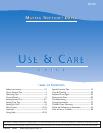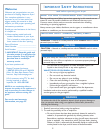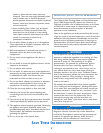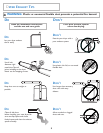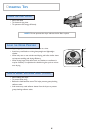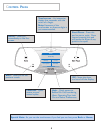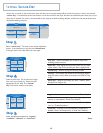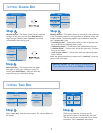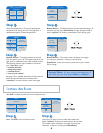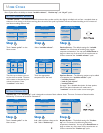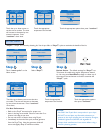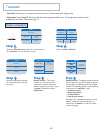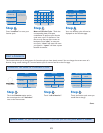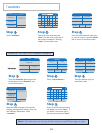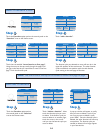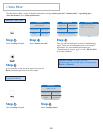
2
S
AVE
T
HESE
I
NSTRUCTIONS
liquids or solids and their fumes have been
removed. There are many highly flammable items
used in homes, such as: acetone, denatured
alcohol, gasoline, kerosene, some liquid household
cleaners, some spot removers, turpentine, waxes
and wax removers.
b. Items containing foam rubber (may be labeled
latex foam) or similarly textured rubber-like
materials must not be dried on a heat setting.
Foam rubber materials when heated, can under
certain circumstances produce fire by
spontaneous combustion.
3. Do not allow children to play on or in the appliance.
Close supervision of children is necessary when the
appliance is used near children.
4. Before the appliance is removed from service or
discarded, remove the door to the drying
compartment.
5. Do not reach into the appliance if the drum is
moving.
6. Do not install or store this appliance where it will be
exposed to the weather.
7. Do not tamper with controls.
8. Do not repair or replace any part of the appliance or
attempt any servicing unless specifically recommended
in published user-repair instructions that you
understand and have the skills to carry out.
9. Do not use fabric softeners or products to eliminate
static unless recommended for dryer use by the
manufacturer of the fabric softener or product.
10.Clean the lint screen before or after each load.
11.Keep the area around the exhaust opening and
surrounding areas free from lint accumulation, dust
and dirt.
12.The interior of the dryer and exhaust duct should be
cleaned periodically by qualified service personnel.
13.This appliance must be properly grounded. Never plug
the appliance cord into a receptacle which is not
grounded adequately and in accordance with local and
national codes. See installation instructions for
grounding this appliance.
14.Do not sit on top of the clothes dryer.
The California Safe Drinking Water and Toxic Enforcement
Act of 1986 (Proposition 65) requires the Governor of
California to publish a list of substances known to the State
of California to cause cancer or reproductive harm, and
requires businesses to warn customers of potential
exposures to such substances.
Users of this appliance are hereby warned that the burning
of gas can result in low–level exposure to some of the listed
substances, including benzene, formaldehyde, and soot, due
primarily to the incomplete combustion of natural gas or
liquid petroleum (LP) fuels. Exhaust ducts should be kept
free of obstructions and properly exhausted dryers will
minimize exposure.
Do not place into your dryer items that have been
spotted or soaked with vegetable oil or cooking oil. Even
after being washed, these items may contain significant
amounts of these oils. The remaining oil can ignite
spontaneously. The potential for spontaneous ignition
increases when the items containing vegetable oil or
cooking oil are exposed to heat. Heat sources, such as
your clothes dryer, can warm these items, allowing an
oxidation reaction in the oil to occur. Oxidation creates
heat. If this heat cannot escape, the items can become hot
enough to catch fire. Piling, stacking or storing these
kinds of items may prevent heat from escaping and can
create a fire hazard.
All washed and unwashed fabrics that contain vegetable
oil or cooking oil can be dangerous. Washing these items
in hot water with extra detergent will reduce, but will not
eliminate, the hazard. Always use the “cool down” cycle
for these items to reduce the items’ temperature. Never
remove these items from the clothes dryer hot or
interrupt the drying cycle until the items have run
through the “cool down” cycle. Never pile or stack these
items when they are hot.
Gas leaks may occur in your system and result in a
dangerous situation. Gas leaks may not be detected by
smell alone. Gas suppliers recommend you purchase and
install an UL approved gas detector. Install and use in
accordance with the manufacturer's instructions.
IMPORTANT SAFETY NOTICE & WARNING
WARNING
WARNING



